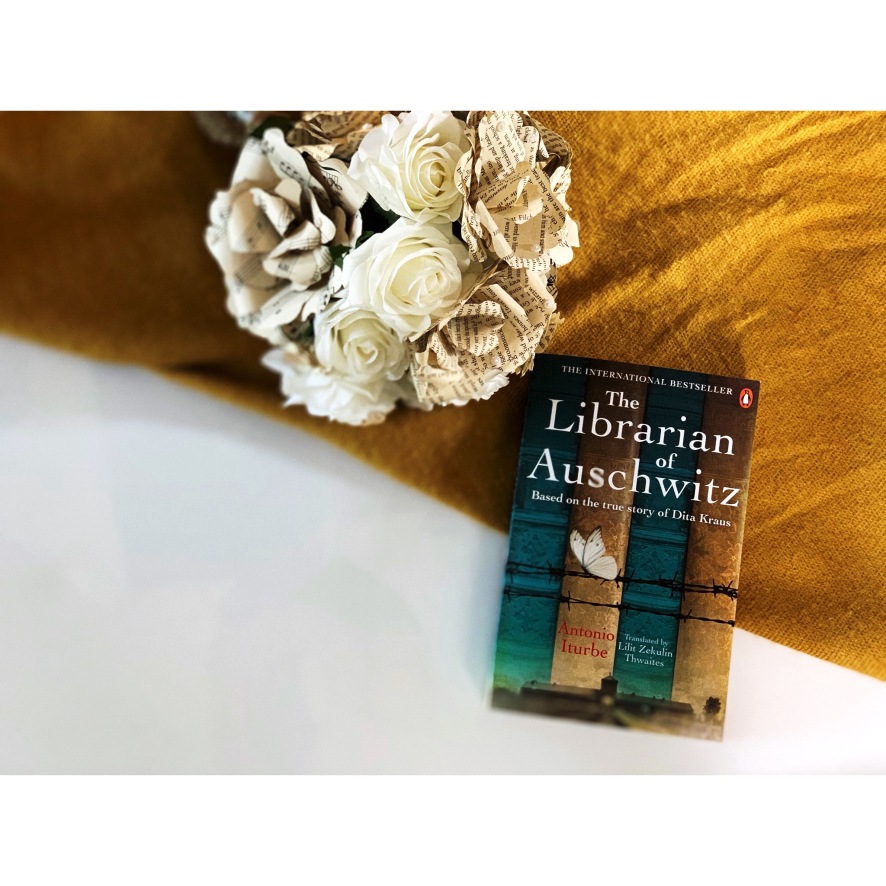“Life, any life, is very short. But if you’ve managed to be happy for at least an instant, it will have been worth living.”

RATING:
⭐️⭐️⭐️⭐️
SYNOPSIS:
‘It wasn’t an extensive library. In fact, it consisted of eight books and some of them were in poor condition. But they were books. In this incredibly dark place, they were a reminder of less sombre times, when words rang out more loudly than machine guns…’
Fourteen-year-old Dita is one of the many imprisoned by the Nazis at Auschwitz. Taken, along with her mother and father, from the Terezín ghetto in Prague, Dita is adjusting to the constant terror that is life in the camp. When Jewish leader Freddy Hirsch asks Dita to take charge of the eight precious books the prisoners have managed to smuggle past the guards, she agrees. And so Dita becomes the secret librarian of Auschwitz, responsible for the safekeeping of the small collection of titles, as well as the ‘living books’ – prisoners of Auschwitz who know certain books so well, they too can be ‘borrowed’ to educate the children in the camp.
But books are extremely dangerous. They make people think. And nowhere are they more dangerous than in Block 31 of Auschwitz, the children’s block, where the slightest transgression can result in execution, no matter how young the transgressor…
REVIEW:
I always find it difficult to pick up books of this nature, as there is nothing to look forward to in relation to them. I can appreciate a good book but when the subject matter is so raw and emotional I struggle to put into words how I feel as well as ensuring that I give the book justice.
The Librarian of Auschwitz is a difficult read, but it is so worthwhile and I would recommend it to everybody. I love Dita, the main protagonist within this book. She is such a strong female character and I feel that in this era, strong female characters are very much underrepresented. She is going through so much yet she still stays strong and faithful to those that she loves.
I picked up the subtle discussion in relation to dementia/alzheimers at a time when people do not understand and just assume that those that have it are mad. It is strange to see how times have changed so much and how this kind of thing is now understood and accepted. I felt so sorry for Morgenstern, he had no support but just got on with things despite being singled out within his social group. Whilst discussing prevalent topics of society that have changed I enjoyed reading the story of Fredy Hirsch, the fact that he is a gay man but having to hide this because he would die. I still think there is a stigma attached to LGBTQ+ within society today however to see the extent to which it wasn’t accepted in previous times is fascinating.
The idea that books are deemed dangerous by the Nazi’s as they make you think really made me think. This concept was so thought-provoking. I couldn’t help but think how much of a sad life I would leave if I lived in a world where books were banned. I love escaping into a good book when things in my life aren’t going how they expected or I am feeling particularly sad. It helps me put my life aside and focus on something else. In a time that this book is set, books could have proved to be a prevalent coping mechanism. I love how those at the camp ensured that children and adults likewise were exposed to books regardless of how limited this exposure was.
Trigger warning: Obviously this is a very sad book and you can expect to come across some really sad concepts. However this can be very descriptive. There are truly awful graphic descriptions of gas chambers and the looks on peoples faces as they enter not knowing what they are about to face. This was done in a very delicate way and in a way that it should be. I feel that if the author was to try change the experiences in the gas chambers to protect the readers feelings would be an insult to those that had to go through what they did.
The death of Dita’s mother and father, on separate occasions, killed me. However the solicarity that her mother shows when leaving the concentration camp before dying really warmed my heart. I love that she was strong enough to rebel, but I am so gutted that she found freedom but before she could enjoy this her life was taken away. I also hated the fact that Dita and her mother couldn’t be there for her father when he died, I can’t imagine not being allowed to see my dad in his time of need, how did they cope with that? They are such strong individuals and I admire them so much. I love the ending of this book and the sneaky name drop of Anne Frank and her sister.
For me, the only reason it isn’t 5 stars is I preferred the writing style that was adopted in The Tattooist of Auschwitz. I know it is a different

